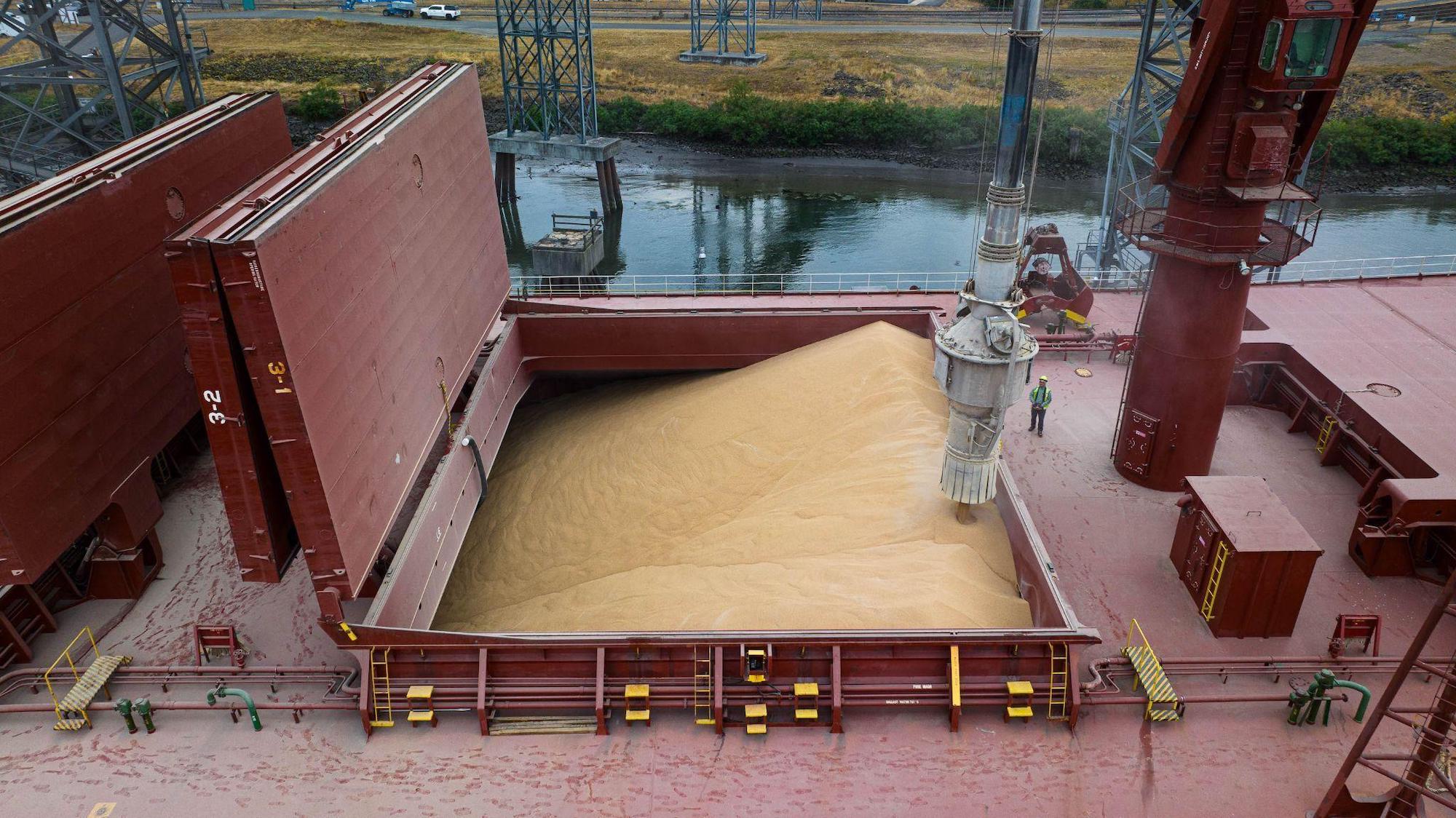Houthi Video Shows Sinking of M/V Magic Seas in Red Sea
Yemen’s Houthi militants have released propaganda footage appearing to show the Greek bulk carrier M/V Magic Seas sinking in the Red Sea following their attack on July 6. The vessel...

A shipment of American-grown wheat on the US-flagged Liberty Glory in the Port of Longview, Washington, as part of the Food for Peace program. Photo from 2023. Photo courtesy American Maritime Congress
By Charlotte Goldstone (The Loadstar) –
Chinese retaliation to US tariffs will hit the “low-margin” agricultural sector the hardest, and White House officials haven’t grasped the full impact, say experts.
Peter Friedmann, executive director at the Agriculture Transport Coalition, told operator Port of Long Beach’s Port Update he was “very concerned” for US agriculture exporters in a trade war with China.
“We recall the tariffs imposed six, seven years ago, against China. It retaliated and inflicted a lot of injury on US agriculture exports, to the extent that the [previous] Trump administration had to generate billions of dollars of price support and other subsidies to help US farmers survive the loss of cargo,” he said.
One of the reasons this sector is most at risk is due to “global competition” and “low margins”.
“If you have a 12-year-old and they want shoes, they care, does it have a ‘swoosh’ on it? Does it have three stripes? And they want that. Try giving your kid some other thing that’s not the brand they want, that’s popular at school that year. You’ll have to pay a little more for it if there’s additional costs.
“But for our agriculture exports, those hogs in China that eat the soybeans don’t give a darn if it’s coming from Minnesota, North Dakota, Brazil, or Argentina.”
According to data from the US Department of Agriculture, China is currently the biggest market for US soybean exports, having received 17.9m tonnes between October and January. However, in January 2024, that total was 3.8m tonnes, compared with just 1.8m imported in January 2025.
Mr Friedmann continued: “We’re at 20% tariffs imposed on China, and China is imposing 25% on our exports. But the difference is that China has learned over the past six years they better diversify their sourcing. So even before this, Brazil has come in and taken a lot of market share.
“China is very clever in its tariffs this time. They have selected products where they have alternative sources. Cotton, pork, beef, soybeans, all being hit by massive tariffs. So, we’re very concerned for agriculture, because this becomes not just a temporary short-term thing but can continue for a long time. And that’s why we are up in arms.”
At last week’s TPM25 by S&P Global, Scott Lincicome, VP of economics and trade at the Cato Institute, claimed that aside from US trade representative James Greer, others in the cabinet likely “don’t grasp the complexity” of tariffs.
“Does someone like Greer actually have a voice in all of this? Or is he a backbencher?” he asked.
Cindy Allen CEO of consultancy Trade Force Multiplier, added: “The president has set an agenda of ‘these are the outcomes that I want’, and he doesn’t care, essentially, how that is done.
“His core team at the White House is tasked with carrying that out, and those agency heads, for the most part, don’t have a say. They are not seen as decision-makers anymore, they are seen as implementers by the administration… It’s very much driven by a small group of individuals.”
Ms Allen explained that the process of “tweet and put into effect” has made it hard for trade stakeholders to communicate the detrimental effects of policies.
“Our normal paths of communication through congressional representatives, through our contacts at different agencies, are simply not able to influence a correction… that’s unprecedented,” she said.

Sign up for gCaptain’s newsletter and never miss an update

Subscribe to gCaptain Daily and stay informed with the latest global maritime and offshore news


Stay informed with the latest maritime and offshore news, delivered daily straight to your inbox
Essential news coupled with the finest maritime content sourced from across the globe.
Sign Up